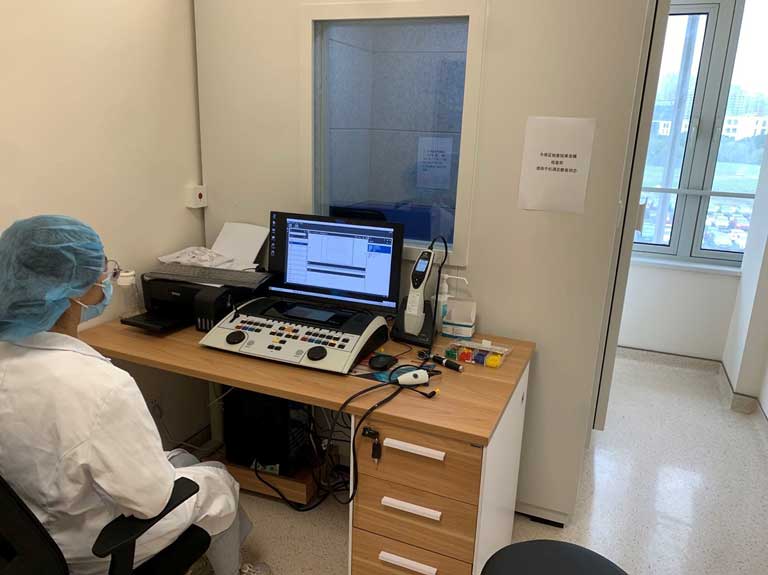Join the Interacoustics community and receive news about new products, events and much more
Limited desktop space in your clinic? 5 reasons why the Titan may be your savior
A complete, diagnostic audiological test battery may include:
- Audiometry
- Tympanometry
- Otoacoustic emissions (OAE)
- Automated auditory brainstem response (ABR) testing
Or any combination of the above, depending on the size of your clinic and the patient population you diagnose. A separate piece of equipment for each test would entail an audiometer, a tympanometer, an OAE device, and an ABR device.
For clinics with limited space or limited staff, it may not be possible or make sense to house so much equipment, as illustrated in the image below.

So, what can you do if you want a complete test battery despite space limitations? Enter the Titan, and here are five reasons why.
1. Optimized clinic setup
The Titan is a 3-in-1 multipurpose tool, which can do tympanometry, OAE and automated ABR testing. For small clinics with little table room, the Titan is an excellent supplement to an Interacoustics audiometer, as shown in the image above.
Being both PC-based and handheld, you can easily transport it between clinics and bring it on the road for home visits.
2. Pressurized OAE
The Titan can perform OAE in ears with positive or negative middle ear pressure. This is possible with pressurized OAE, which compensates for middle ear pressure.
This can be useful in many cases. For example, pressurized OAE can be useful in patients with a type C tympanogram, where the middle ear status might cause a REFER [1].
3. Improved workflow and test efficiency
With the Titan, you can perform tympanometry and OAE without having to change device or probe. Generally speaking, this will save you time and effort.
And if you’re performing measurements in infants, the chance of them waking up is reduced, meaning less visits and faster diagnosis.
4. Wideband tympanometry
Titan’s wideband tympanometry (WBT) software measures 100 tympanograms at the same time, and averages over 32 tympanograms to produce a single tympanogram.
By averaging out noise and artefacts, you’ll likely only need to test once or twice, rather than several times with traditional tympanometry. This is especially beneficial in babies and young children.
5. The power of performing both OAE and tympanometry
The Titan offers two types of OAE:
- Distortion product otoacoustic emissions (DPOAE)
- Transient evoked otoacoustic emissions (TEOAE)
DPOAE and/or TEOAE are great for newborn hearing screening, as they are very sensitive measurements and will produce a REFER if a hearing loss is present.
In conjunction with the above-mentioned OAE measurements, tympanometry can help with the diagnosis and treatment. For example, a patient with a REFER on the OAE measurement and a type C tympanogram would imply a full middle ear.
Make the most of the space available to you
We understand the frustrations of the space constraints you might face. To make your life a bit easier, we recommend that you go the route of multipurpose equipment.
In this regard, the Titan is not only a Swiss knife for hearing testing, but it also excels in both clinical utility and usability:
- Tympanometry, OAE and automated ABR in one device
- It can compensate for middle ear pressure
- Less visits and faster diagnosis
- Measure many frequencies and average out noise and artefacts with WBT
- When your patients REFER in OAE, you can supplement with tympanometry
To learn more about the Titan and if it’s the right fit for you, access the Titan product page or contact your local office.
References
[1] Zimatore G, Skarzynski PH, Di Berardino F, Filipponi E, Hatzopoulos S. Differences between Pressurized and Non-Pressurized Transient-Evoked Otoacoustic Emissions in Neonatal Subjects. Audiol Neurootol. 2021;26(5):346-352. doi: 10.1159/000512762. Epub 2021 Mar 10. PMID: 33691303.
About the author
Rasmus Skipper, MSc Audiology, graduated from the University of Southern Denmark in 2020. Following two years of clinical practice at Odense University Hospital, Rasmus joined Interacoustics in April 2022 as Clinical Product Manager within ABR and OAE.
Similar Topic
Stay up to date!
Subscribe to our newsletter and receive news on new products, seminars and much more.
By signing up, I accept to receive newsletter e-mails from Interacoustics. I can withdraw my consent at any time by using the ‘unsubscribe’-function included in each e-mail.
Click here and read our privacy notice, if you want to know more about how we treat and protect your personal data.
